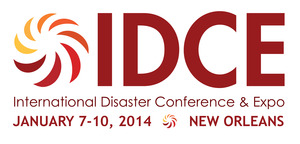IDCE 2014 organizers are seeking thought leaders from both public and private sector organizations to lead discussions in lunchtime Town Hall Forums on Wednesday, January 8 and Thursday, January 9 from approximately 12:30 p.m. until 1:30 p.m. The Town Hall Forums will take place on the expo hall floor and offer unique opportunities for attendees, exhibitors, and speakers to collaboratively share thoughts, ideas, and experiences that will shape future industry trends and best practices through partnerships developed with both public and private sector leaders. Attendance at these forums will be open to anyone present on the expo hall floor.
With a total of 8 sessions planned, IDCE is seeking one public sector and one private sector representative at each session, for a total of 16 forum leaders. Interested groups can select a topic from the list provided, or submit a relevant topic of their own choosing, along with a brief presentation outline and speaker bio(s). IDCE organizers will review all submissions and make final selections. Priority consideration will be given to submissions that include a representative from both the public and private sector as forum leaders. Submissions from an individual presenter will be evaluated and considered on a case-by-case basis in order to determine where leaders can be paired.
Please send all submission information to Kristen Chighizola, IDCE Conference Manager, at Kristen@idcexpo.net. Deadline for submission is October 18, 2013.
List of potential topics:
IDCE 2014 TOWN HALL FORUM DISCUSSION TOPICS - IT Risk Management: cost of downtime, changes in business resiliency (complexity, global economy, regulatory pressures, security). Having a risk management plan is an essential step for success in the face of disaster. In recent times, businesses have faced drastically different conditions for IT risk management.
- Cyber Attack: potential for national security risks, data breach, impact of disruption, prevention. Cyber attack is a real threat on an individual, organizational, and national level. Business leaders must learn how to properly secure technological property to prevent danger in their companies.
- Financial Services and Planning: building, maintaining, and auditing a business continuity plan. Keen financial planning is crucial for a company’s ability to recover in a crisis. Financial professionals must be involved in all stages of the disaster recovery plan.
- Disaster Preparation in Big Business v. Small Business: disaster preparedness, disaster recovery, tax assistance. When disaster strikes, all businesses are not equally affected. Small businesses face a unique set of challenges in the face of an emergency. However, with the support and leadership from bigger companies, small business owners can feel more confident.
- Mitigation: site selection, uninterruptible power supplies, research regulations, insurance. Businesses can often prevent disasters from causing excessive damage if planning is completed beforehand. Mitigation involves actively developing a plan for deterrence and recovery in the event of an emergency.
- Public-Private Partnerships: identifying stakeholders, developing a mutually beneficial partnership, ChicagoFIRST (national model for P3). In disaster recovery, the best results frequently stem from collaboration between public and private organizations. Leaders of these organizations must learn to work together and to identify ideal partners to achieve the greatest outcome.
- Navigating the Court of Law and the Court of Public Opinion: role of lawyers and public relations managers in crisis management, protecting brand/image in disaster, maintaining public trust. In the event of an emergency situation, companies are exposed to a plethora of issues, including legal problems. Executives must prevail over the court of law while regulating the public’s view of the company.
- Involving the Hispanic Community in Emergency Management: contact key media, form relationships with Latino groups, understand the audience. The Hispanic population of the United States is growing, and the need to communicate with them effectively is more vital than ever. Officials need to identify key focus groups that will improve the method of reaching out to these individuals in times of crisis.
- Meeting Children’s Needs after Disasters: coping with stress, Sandy Hook School shooting, Boston Marathon bombings. In the past few years, children have witnessed a rise in violence. Community leaders can learn the best ways to provide assistance for families when stabilizing and comforting their children after a devastating event.
- Unique Needs of the Elderly in Response and Recovery: distinct needs of the handicapped, adequate shelters, post-disaster needs. As a result of the Baby Boomer generation, the American population is aging. Elderly citizens face a unique set of challenges in disasters, such as visual, auditory, or physical handicaps. Officials must have clear operational and communications plans developed to assist the specific needs of the elderly.
- Emergency Management Degree Programs: CPG 101, FEMA courses, emphasis on real world situations. Emergency managers who are hiring recent college graduates in the field find their studies are not necessarily helpful to their career. Instead of focusing primarily on academic studies, disaster professionals believe there should be a significant emphasis on how to handle real world circumstances.
- State Law Requiring School Emergency Plans: communications, police involvement, technology. After the Newtown school shooting, government officials see the necessity more than ever to enforce laws for school emergency plans. Both emergency managers and school leaders hope either new or revised crisis plans will help protect children from violence.
- Responding to Multiple Casualty Shootings: Aurora movie theater shooting, Sandy Hook, Boston Marathon, Gabrielle Giffords. The sharp increase in gun violence has called attention to how organizations can prepare to react in the event of an active shooter. The Department of Homeland Security encourages institutions to use threat assessment and intervention to prevent escalation towards a violent act.
- Takeaways from the Boston Marathon Bombings: crowd control, preparedness, response teams. When two bombs were set off at the Boston Marathon in 2013, the city’s Public Health Commission expedited the recovery for what could have been a much worse situation. The city’s preparedness handled the situation as effectively as possible and set a precedent for future situations.
- Strengthening Communication and Leadership for Emergency Professionals: use of social media, alignment of strategic and operational planning, teamwork. Communication is the essence of a successful operation in a disaster. Emergency managers with a precise plan for communication will accomplish recovery more efficiently.
- Advantages and Disadvantages of Social Media: quicker connections, aid in response effort, miscommunication, crisis trigger. In the age of social media, emergency responders are finding both a new way to communicate efficiently and a new challenge to overcome. Social media allows officials to spread information quickly and easily to stakeholders but leaves a potential for the creation of misinformation.
- Technological Advances in Emergency Management: automated fire ground management, thermal imaging, communication technology. New technology has enabled emergency managers to handle crisis situations more proficiently. Innovations such as thermal imaging and robotic technology completely alter the way responders approach emergencies.
- The Great Debate: Emergency Records Stored on Paper or Electronically?: loss of electricity, ease of transfer, cost. Emergency managers face the decision to record important documents electronically or on paper. Those in favor of electronic files say it is cheaper and more convenient. Those who prefer paper argue that electricity and internet access is not always available in times of crisis, rendering electronic records void.
- Managing Evacuation Shelters: victims of domestic violence, contagious disease, admittance of pets, potential for public policy. When citizens are relocated to evacuation shelters, there are a variety of issues at hand. Emergency managers must skillfully handle problems arising when an individual with a transmittable disease enters the shelter or victims of domestic violence are housed in the same shelter as their abusers.
- Health and Safety Regulations: circumstances of a hero, ethical/moral issues, need for control. Emergency professionals are questioning whether health and safety regulations have gone too far. Should emergency responders be required to risk their lives to save others, or is it a matter of circumstance?
- Geofencing Alerts: intrusion of privacy, public safety service, optional or required. Emergency managers are considering the possibility of sending alerts via mobile devices upon entering a disaster-prone area. However, there is debate over whether the practice would be considered an invasion of privacy or an act of public service.
- Natural Disasters’ Negative Effects on Insurance Companies: low investment income, property damage, “soft” market (fierce competition and difficulty raising premiums). Natural disasters affect the economy negatively, including insurance companies. Consequently, insurers face the constant battle of the attempt to cover costs and the public’s resistance to higher premiums.
- How Climate Change Is Altering Insurance Policies: global warming, greenhouse gases, weather patterns. With the global climate change and rising temperatures, insurance companies are starting to look for ways to restructure the industry. Higher temperatures mean frequent and volatile natural disasters, which directly affects the insurance industry and its profits.
- Japanese Earthquake/Tsunami: failure of the tsunami warning system, evacuation planning, reconstruction efforts. When a destructive tsunami hit Japan, the once reliable warning system failed. Officials can learn from the flaws in the Japanese system to better prepare their own countries for disaster.
- Floods in India: lack of preparation, significant financial loss, poor disaster management. The floods of 2013 in northern India reveal the insufficient plans of a nation prone to disaster. Even with financial aid from around the globe, recovery will not be achieved until a completely restructured disaster management plan is created.
- Surge Capacity in Health Care: incident management system, maximize conventional and contingency capacity, coordination with regional disaster program and other institutions. When disaster strikes, health care facilities must be equipped to handle the increased flow of patients. Planning for surge capacity is an intricate process that involves partnering with multiple organizations and officials.
- Reaching Out to Individuals with Special Health Care Needs: emergency transportation, sheltering, disability phone tree. Disabled individuals face a plethora of additional challenges in a crisis. Emergency managers must discover the most ideal way to organize, assist, and communicate with individuals with special health care needs.
- Admittance of New Patients during HAZMAT: security, additional risk to current patients, potential for evacuation. During a shelter in place scenario, hospitals face the dilemma of whether to accept new patients or refuse to treat them. Additionally, hospital administration must navigate an increased level of security.
- Stress and PTSD: mitigation, local intervention, stigmatization. The psychological effects of a disaster, such as depression, suicide, and PTSD, are often considered a stigma in the general public. Emergency managers must learn how to overcome these harmful images and help suffering individuals recover from traumatic events.
- Successfully Integrating Spontaneous Volunteers: formation of a Volunteer Coordination Team, identification of all potential partners, development of communication tools. Disasters evoke a large number of volunteers ready to restore a community. Unfortunately, many organizations are not prepared for the influx of volunteers and their eagerness to help is underutilized.
- Unsolicited Donations: truckloads of needless items, disaster within a disaster, lack of a system. In times of disaster, community members come together and donate miscellaneous items with the intention of helping the group in need. However, many officials believe that financial donations are far preferable than other contributions. Emergency managers must learn how to organize and control unsolicited donations.
|



